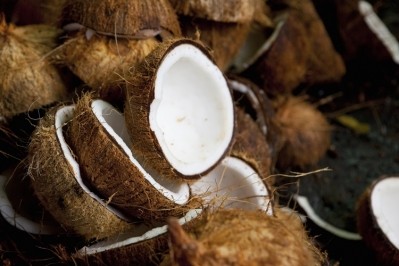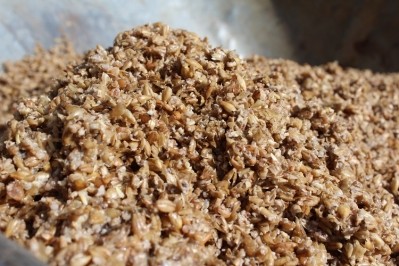Consumers prefer ‘free-from’ palm oil to ‘sustainably produced’ palm oil claim, study finds

The study, undertaken by researchers from Germany’s Göttingen University and funded by public research organisation Deutsche Forschungsgemeinschaft (which is in turn funded by federal and state governments in Germany), looked into consumer attitudes towards palm oil, and how they compare with the reality of palm oil’s sustainability.
Palm oil and the environment
The effectthat vegetable oils have on the land is difficult to truly assess. While the direct effect of increased land use is clear, the indirect effects can be more challenging to work out. This is an issue particularly when food crops are displaced elsewhere by other agricultural practices, leaving the environmental impact of the displaced food production to go elsewhere. This phenomenon is known as indirect land use change (ILUC).
Palm oil has a proven negative impact on the land. For example, despite only taking up 10% of cropland, its production is responsible for 37% of biodiversity loss resulting from four key oil crops (the other three being rapeseed, soybean and sunflower oil).
It is, however, possible to produce it with low ILUC potential: for example, the study suggests, on degraded grasslands, as the crop displacement from such areas are likely to be less significant. The study suggests that such a shift to more sustainable, low-ILUC palm oil cultivation can meet market demand without the environmental damage of the worst excesses of the palm oil industry.
The study also points out the negative effects of other oils. While rapeseed and sunflower oil may have a lower impact on biodiversity loss (9% for rapeseed and 4% for sunflower oil) their yield is significantly lower than that of palm oil, which on average has an abnormally high yield. For context, to get the same level of yield for soybean oil, the second-highest yielding vegetable oil, would require six times the land. On the other side of the coin, coconut oil, while rarely produced, threatens 18.33 species for every million tonnes produced, compared with 3.79 species for palm oil.
Changing public opinion
Despite the complexity of palm oil’s sustainability, the study suggests, the general public tend to hold a more black-and-white, nakedly hostile view of the commodity, due, the study suggests, to lack of education on the nuances of its different forms of cultivation. This is despite certified sustainable palm oil (CSPO) being encouraged and approved by organisations such as the World Wildlife Fund, the London Zoological Society, and the International Union for the Conservation of Nature.
Furthermore, there is poor consumer knowledge of the Roundtable on Sustainable Palm Oil (RSPO), the most significant palm oil certification body for palm oil, due to its logo's limited use on products. According to RSPO, its CSPO represents 20% of global palm oil production.

Surveying 1220 respondents, the study found that German consumers still associate palm oil with environmental destruction. Some of the most popular associations were ‘rainforest deforestation’ (19.4% of respondents) and ‘environmentally damaging’ (9%). Many people also associated it with poor working conditions, social displacement, and even unhealthiness. Most overlooked its use as a biofuel, even though 45% of palm oil imports into the EU are used for this purpose.
Around a third of respondents received additional information focusing on palm oil, such as yield and ecological impact, compared to other oils, and another third received information on palm oil’s relationship with ILUC (the final third received neither).
However, these different levels of information did not drastically affect consumer perception of the sustainability of palm oil or their trust of the RSPO logo.
Furthermore, despite being given information on the sustainability of other oils in comparison to palm oil, people are still largely likely to disagree that there is any context in which palm oil can be the better option.
“Sustainability in agricultural supply chains is complex,” the RSPO Secretariat told FoodNavigator.
“As the author correctly stated, ‘‘Free-from’ claims create a misleading perception of sustainability’ and are more visible than products with certified sustainability labels. Additionally, consumers are poorly informed about environmental impact and overall sustainability.”
Consumer misconceptions
The study suggested that high-profile campaigns against palm oil had set consumers against the ingredient, despite the fact that many producers use RSPO-certified palm oil and are committed to zero deforestation.
Presenting how bad press can be misleading, the study showed that many consumers perceived Brazil to be a far larger producer of palm oil than it actually is, likely in light of the fact that the country is the world's largest soybean producer and has been associated with deforestation in the past.
Information, the study concludes, is not alone enough to break through entrenched perceptions among consumers.
“Companies, the media and interested organisations have the role of educating consumers that a boycott of palm oil will not solve the complex challenges within the industry,” RSPO told us.
“Instead, a boycott of palm oil will negatively impact the livelihoods of millions of people in palm oil-producing countries and regions and land use change for other vegetable oil crops will require four to ten times more land.”
Sourced From: Sustainable Production and Consumption
'Can consumers understand that there is more to palm oil than deforestation?’
Published on: July 2023
Doi: https://doi.org/10.1016/j.spc.2023.05.037
Authors: S. Lieke, A. Spiller, G. Busch




















